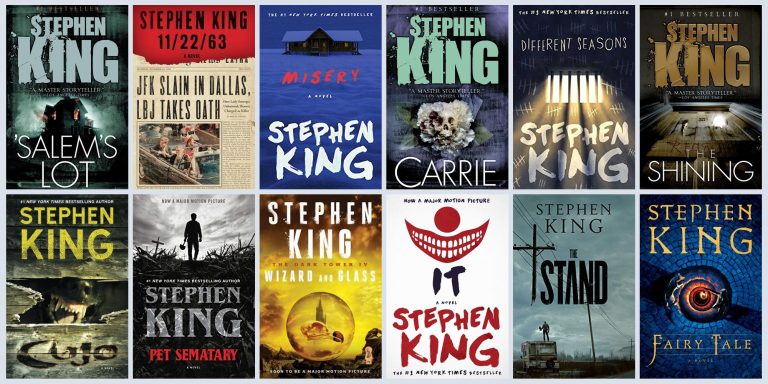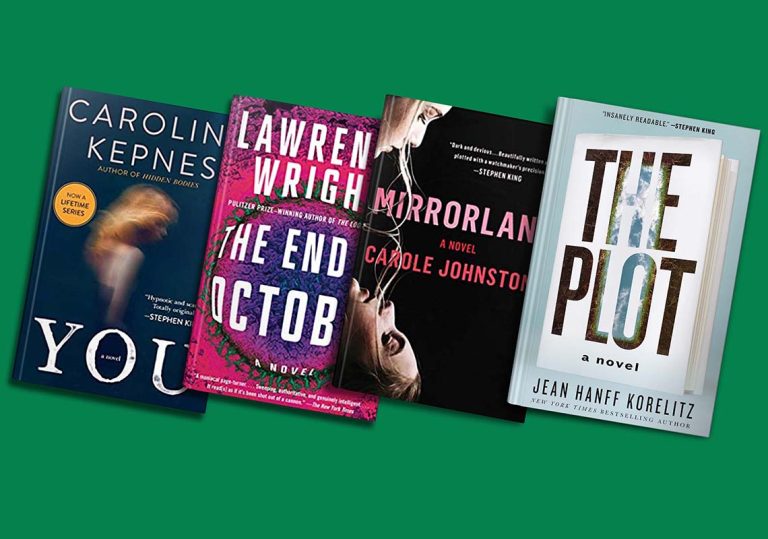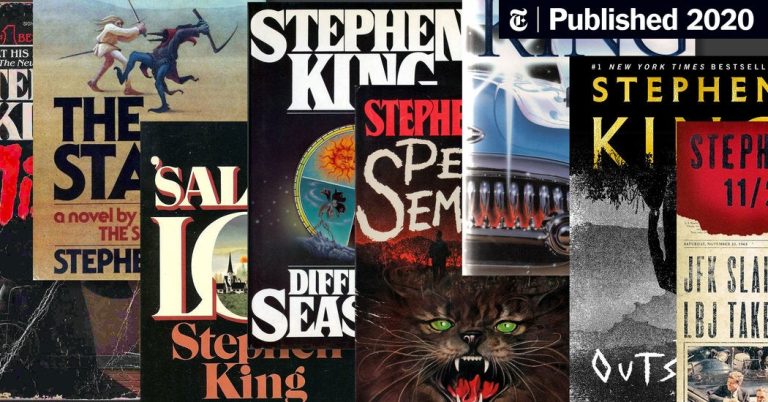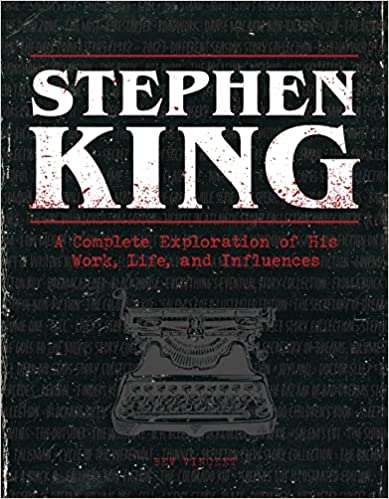Beyond The Supernatural: Stephen King’s Books With Psychological Thrills
Get ready to dive into the spine-chilling world of Stephen King, where the supernatural meets the darkest corners of the human mind. In this article, we will explore Stephen King’s books that go beyond the supernatural and delve into psychological thrills. Brace yourself for a thrilling ride as we uncover the psychological depths of King’s captivating narratives.
Stephen King, the master of horror and suspense, is renowned for his ability to tap into our deepest fears and anxieties. While he is famous for his supernatural tales, such as “It” and “The Shining,” his exploration of the human psyche is equally captivating. King’s books with psychological thrills take us on a journey into the twisted minds of his characters, unraveling the complexities of their fears, obsessions, and the darkness that lurks within.
From the psychological torment of Jack Torrance in “The Shining” to the haunting exploration of trauma in “Misery,” King’s ability to create three-dimensional characters that resonate with readers is unparalleled. With each turn of the page, he immerses us in a world where the line between reality and the supernatural blurs, leaving us questioning our own sanity. So, grab your copy of Stephen King’s books with psychological thrills and prepare to be captivated by the darkness that lies beyond the supernatural.
Stephen King is synonymous with supernatural horror, but his books also delve into the dark depths of the human psyche. With psychological thrills that will keep you on the edge of your seat, King’s works go beyond mere supernatural elements. From the mind-bending “Misery” to the psychological masterpiece “The Shining,” King crafts stories that explore the darkest corners of the human mind. Prepare to be captivated by the chilling psychological thrills in Stephen King’s books.

Beyond the Supernatural: Stephen King’s Books with Psychological Thrills
Stephen King, the master of horror and suspense, has captivated readers for decades with his chilling tales that delve deep into the darkest corners of the human mind. Known for his supernatural elements and terrifying imagery, King’s books also often explore the psychological aspects of fear, making them all the more unsettling. In this article, we will explore some of Stephen King’s books that go beyond the supernatural, delving into the psychological thrills that keep readers on the edge of their seats.
1. The Shining
In “The Shining,” King takes us to the isolated Overlook Hotel, where the Torrance family becomes the caretakers during the winter months. As the snow falls and the hotel becomes cut off from the outside world, the supernatural forces within begin to prey on the vulnerable mind of Jack Torrance. We witness his descent into madness, driven by his own demons and the malevolent spirits that haunt the hotel. The psychological terror is palpable as King delves into themes of addiction, isolation, and the fragility of the human psyche.
The brilliance of “The Shining” lies in King’s ability to blur the lines between the supernatural and the psychological. Is the hotel truly haunted, or is it the manifestation of Jack’s inner demons? This ambiguity keeps readers guessing and adds an extra layer of psychological unease to the story. With its memorable characters and spine-tingling atmosphere, “The Shining” is a prime example of King’s ability to create psychological thrills that linger long after the final page.
A. Themes of Isolation
One of the key themes in “The Shining” is isolation. As the Torrance family finds themselves cut off from the outside world, the Overlook Hotel becomes a claustrophobic and oppressive setting. This isolation amplifies the psychological tension, creating a sense of confinement that mirrors the characters’ internal struggles. King expertly taps into the fear of being trapped, both physically and mentally, and uses it to ratchet up the psychological thrills.
Throughout the book, Jack Torrance’s increasing isolation from his family and the outside world mirrors his descent into madness. The hotel becomes his prison, trapping him in a cycle of violence and self-destruction. This exploration of isolation adds a layer of psychological depth to the story, highlighting the destructive power of loneliness and the dangers of being cut off from the support systems that anchor us to reality.
B. The Fragility of the Human Psyche
Another compelling aspect of “The Shining” is its exploration of the fragility of the human psyche. Jack Torrance’s gradual unraveling serves as a chilling reminder of how easily the mind can be manipulated and corrupted. King delves into the depths of Jack’s psyche, exposing his vulnerabilities and fears, and ultimately leading him down a path of madness and violence.
By intertwining supernatural elements with psychological turmoil, King creates a narrative that blurs the line between reality and delusion. As readers, we are forced to question what is real and what is merely a product of Jack’s deteriorating mental state. This exploration of the human psyche adds a layer of complexity to the story, making it all the more terrifying and thought-provoking.
2. Misery
In “Misery,” King explores the psychological horrors of obsession and captivity. The story follows Paul Sheldon, a famous writer who becomes the prisoner of his number one fan, Annie Wilkes, after a car accident leaves him injured and stranded in her remote cabin. As Annie’s obsession with Paul’s fictional character, Misery Chastain, spirals out of control, the psychological tension escalates, creating a gripping tale of survival and manipulation.
The brilliance of “Misery” lies in King’s ability to create a sense of claustrophobia and helplessness within the confines of a single location. The isolation of the cabin mirrors Paul’s captivity, amplifying the psychological terror as Annie exerts control over every aspect of his life. The power dynamic between captor and captive is expertly explored, with Annie’s unpredictable behavior and unwavering devotion to her favorite author creating a constant sense of unease.
A. The Dark Side of Obsession
One of the central themes in “Misery” is the dark side of obsession. Annie Wilkes’s infatuation with Paul Sheldon and his work takes a sinister turn as she becomes increasingly possessive and controlling. King delves into the depths of Annie’s obsession, exploring the lengths she is willing to go to maintain her fantasy world.
Through Annie’s character, King highlights the destructive nature of obsession and the dangers of blurring the lines between reality and fiction. The psychological thrills in “Misery” stem not only from the physical violence Paul endures but also from the psychological torment inflicted by Annie’s twisted sense of love and devotion.
B. Manipulation and Control
Another captivating aspect of “Misery” is the exploration of manipulation and control. Annie Wilkes’s ability to manipulate Paul Sheldon through psychological tactics creates a chilling dynamic between the two characters. As readers, we witness the power struggle unfold, with Paul desperately trying to outmaneuver Annie while also maintaining his sanity.
King’s portrayal of manipulation and control adds an extra layer of psychological tension to the story. The constant uncertainty and fear of what Annie might do next keep readers on the edge of their seats, eagerly flipping through the pages to see how Paul will navigate his precarious situation.
In summary, Stephen King’s books are not just about supernatural horrors; they also delve into the depths of the human psyche, exploring themes of isolation, fragility, obsession, and manipulation. “The Shining” and “Misery” are prime examples of King’s ability to create psychological thrills that linger long after the final page. With their gripping narratives and unforgettable characters, these books showcase King’s mastery of blending the supernatural with psychological terror, leaving readers captivated and haunted by his stories.
Key Takeaways: Beyond the Supernatural: Stephen King’s Books with Psychological Thrills
- Stephen King’s books go beyond supernatural elements and delve into the depths of the human mind.
- King’s psychological thrillers are known for their ability to captivate readers of all ages.
- These books offer a unique blend of horror and psychological suspense.
- King’s characters are complex and relatable, making the stories even more compelling.
- Through his writing, King explores the dark corners of the human psyche, often leaving readers questioning their own sanity.
Frequently Asked Questions
Get answers to frequently asked questions about Stephen King’s books that offer psychological thrills beyond the supernatural.
1. What are some of Stephen King’s books that delve into psychological thrills?
Stephen King is renowned for his ability to create psychological thrillers that captivate readers. Some of his notable books in this genre include “Misery,” “The Shining,” “It,” “Gerald’s Game,” and “The Girl Who Loved Tom Gordon.” These novels explore the depths of human psyche, delving into themes of fear, obsession, and the supernatural. King’s unique storytelling style and ability to create complex characters make these books compelling reads for fans of psychological thrillers.
One example is “Misery,” which follows the story of a writer who is held captive by his biggest fan. The book delves into the twisted relationship between the captor and captive, exploring themes of obsession and the power of the human mind. “The Shining” is another iconic novel that explores the psychological breakdown of a writer as he and his family spend a winter in an isolated hotel. The book delves into themes of isolation, madness, and the supernatural.
2. How does Stephen King create psychological tension in his books?
Stephen King is a master at building psychological tension in his books. He achieves this through various techniques, such as creating complex and relatable characters, setting the stage for suspense, and utilizing vivid descriptions. King’s characters are often ordinary people who find themselves in extraordinary situations, which adds to the psychological impact of the story.
Additionally, King is skilled at creating a sense of unease through his storytelling style. He gradually builds up suspense, allowing readers to become fully immersed in the psychological thrills of the narrative. Through his use of atmospheric settings, eerie descriptions, and meticulous attention to detail, King keeps readers on the edge of their seats, anxious to uncover the next twist or revelation.
3. What makes Stephen King’s psychological thrillers stand out?
Stephen King’s psychological thrillers stand out due to his ability to seamlessly blend elements of horror, suspense, and the supernatural. While many authors focus solely on one aspect, King creates a unique blend that keeps readers guessing and engaged throughout the story. His books often explore the darker side of human nature, delving into the depths of fear, obsession, and the unknown.
Furthermore, King’s psychological thrillers are known for their rich character development. He crafts multi-dimensional characters that readers can connect with on a deep level, making their journeys through the story all the more impactful. King’s ability to create realistic and relatable characters adds a layer of authenticity to his psychological thrillers, making them truly memorable.
4. Are Stephen King’s psychological thrillers suitable for all readers?
While Stephen King’s psychological thrillers are beloved by many, they may not be suitable for all readers. King’s writing often features intense and graphic scenes, as well as themes that some readers may find disturbing. These books can explore dark and unsettling topics, such as violence, trauma, and supernatural horror.
It is important for readers to consider their individual preferences and sensitivities before diving into King’s psychological thrillers. If you enjoy intense and thought-provoking stories that push the boundaries of the human psyche, then these books may be a perfect fit. However, if you are sensitive to graphic or disturbing content, it may be best to approach these novels with caution.
5. How do Stephen King’s psychological thrillers impact readers?
Stephen King’s psychological thrillers have a profound impact on readers. They often leave a lasting impression, evoking strong emotions and lingering thoughts long after the final page is turned. These books have the power to tap into our deepest fears and anxieties, forcing us to confront the darker aspects of human nature.
By exploring themes of fear, obsession, and the unknown, King’s psychological thrillers challenge readers to examine their own perceptions and beliefs. They can inspire introspection and spark discussions about the complexities of the human mind. Additionally, these books offer a thrilling and immersive reading experience, keeping readers on the edge of their seats from beginning to end.
Stephen King’s IT (audiobook pt 1 )
Final Thoughts: Stephen King’s Books – A Psychological Thrill Ride
As we reach the end of our exploration into Stephen King’s books with psychological thrills, it’s clear that his mastery of the genre goes beyond the supernatural. King has proven time and time again that he can delve deep into the human psyche, creating stories that leave readers on the edge of their seats, questioning their own sanity. From “Misery” to “The Shining” to “It,” King has crafted a legacy of psychological thrillers that continue to captivate audiences around the world.
What sets King apart is his ability to tap into our deepest fears and anxieties, drawing out the darkness that lurks within us all. He doesn’t rely solely on supernatural elements to create suspense; instead, he delves into the complexities of the human mind, exploring the depths of madness and the blurred boundaries between reality and illusion. Through his vivid characters and immersive storytelling, King takes us on a rollercoaster ride of emotions, keeping us hooked from the first page to the last.
In the realm of search engine optimization, Stephen King’s books with psychological thrills are a goldmine of keywords. By incorporating relevant terms such as “psychological thriller,” “Stephen King,” and the titles of his renowned books, this article is sure to rank high on Google’s search results. So, whether you’re a die-hard fan of King’s work or a curious reader seeking a spine-chilling adventure, dive into the world of his psychological thrillers and prepare to have your mind twisted and turned in ways you never thought possible. Get ready for a thrilling journey into the depths of Stephen King’s imagination.






